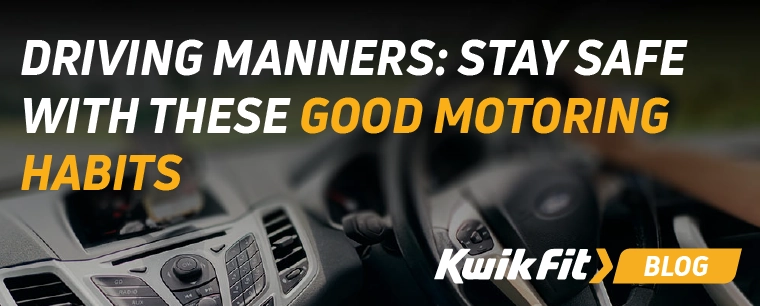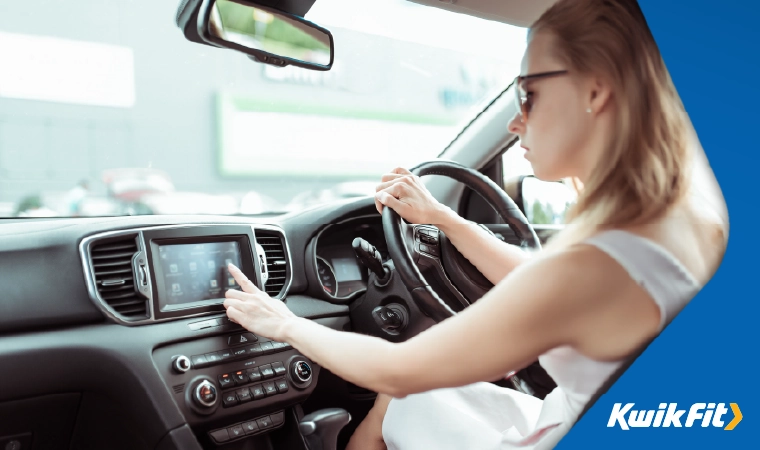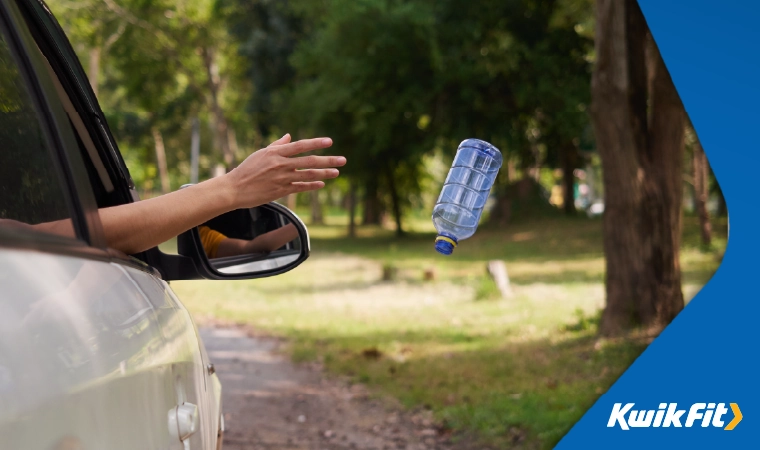Driving Manners: Stay Safe & Polite With These Motoring Habits
| Wednesday 30th July 2025 3:10pm

Would you describe yourself as a safe driver? How about a courteous driver?
While the rules of the road are drummed into us from when weíre first learning to drive, it can be easy to forget the unofficial code of conduct behind the wheel: road manners. If youíre in a hurry and focused on arriving at your destination, it can be easy to let your driving etiquette slip a little.
But, generally speaking, a courteous driver is a safe driver. So, keep yourself, your passengers, and other road users safer out there with this reminder of typical Ďdriving mannersí on the UKís roads.
1. Always use your indicators
Whether youíre switching lanes on the motorway or turning into an upcoming road, itís important that you use your indicators to make other road users aware of your intentions - so that they can adjust their driving accordingly. Failing to use your indicators at the appropriate time is not only dangerous, but it can be extremely frustrating for others. For example:
If you donít signal properly at a roundabout, other drivers will not know where youíre going, making it difficult for them to work out if they can safely proceed or not. In this instance, not indicating could increase your risk of causing a collision, putting the well-being of you and others in danger.
To avoid a situation like this, make sure you always use your indicators correctly. According to the Highway Code, you should give clear signals in plenty of time, using your indicators to advise others of movements such as a change in direction, pulling over and moving off.
2. Thank someone for giving way
If someone gives way to you while youíre behind the wheel, itís polite to say thank you. While it might not seem like a big deal at the time, itís courteous to offer a simple hand signal, such as the palm of your hand or a quick thumbs up, to let the other driver know that you appreciate the kind gesture.
That said, when thanking another driver, itís essential to remain focused on the road and in control of your vehicle; donít get distracted by gestures here.
Avoid headlight flashing
Similarly, when driving in low-visibility conditions (such as fog or at night), some drivers choose to flash their headlights as a ďthank youĒ. While this seems harmless, flashing headlights can be a distraction, confusing other drivers and doing more harm than good.
Because of this, the Highway Code stipulates that you should only use your headlights ďto let other road users know that you are there. Do not flash your headlights to convey any other message or intimidate other road users.Ē

3. Stick to the speed limit
Speed limits are put in place for a reason, and itís important that you adhere to them while youíre out and about on the roads. Any time you drive too fast, youíre putting the safety of yourself, your passengers, other road users, and even pedestrians at risk.
- Aside from the dangers involved, speeding could also land you in trouble with the law.
- The minimum penalty is a £100 fine and three penalty points. In some cases, you could even be disqualified from driving altogether.
So, instead of putting your foot down, make sure that you stick to the speed limit to keep your licence clean and do your bit to help keep the roads a safe place.
4. Never use your mobile phone while driving
In the UK, using a mobile phone while youíre driving is against the law. Even if youíre stopped at lights or waiting in traffic, checking your phone behind the wheel is considered a serious offence. If youíre distracted by your device, youíre four times more likely to be involved in a road accident, putting you and others in danger.
- If youíre caught using your phone, you could receive a £200 fine and six points on your licence.
- You could even be asked to attend a court hearing and pay a bigger penalty fee, or you could be given a driving ban for a set period of time.
So, itís important that you refrain from using your mobile phone until youíve come to a complete stop in a safe place.
Even in stationary traffic...
Many people donít realise that itís also an offence to use your mobile phone while stationary (unless youíve parked somewhere safe and have switched your engine off), especially young drivers.
Research conducted recently on behalf of Kwik Fit revealed that drivers aged between 18 and 24 are nearly three times more likely than the average motorist to think itís legal to use a handheld mobile at traffic lights.
Given that you can now get six penalty points and a £200 fine for using a hand-held mobile behind the wheel, this isnít an issue that any motorist can afford to ignore.
Read more about driving and mobile phone usage.

5. Keep your distance
Not leaving enough space between you and the vehicle in front can not only be frustrating for other drivers, but it can also significantly increase your chances of having an accident.
Otherwise known as Ďtailgatingí, driving too close to the car in front of you can be unintentional, but sometimes itís done on purpose - in an attempt to force the vehicle ahead to move out of the way, or to encourage them to speed up.
The truth is, tailgating can come across as aggressive and intimidating. It can make the driver in front feel targeted, distracting their attention and making it more likely for them to make a mistake.
Tailgating is also considered to be a criminal offence. If youíre found to be driving too close to another car, you could receive a £100 fine and three points on your licence. To avoid being caught out by the law, you should back off and keep an adequate distance between you and the vehicle in front at all times.
6. Position your hands correctly
Next up, a good habit to get into for your safety: abandoning the ďten and twoĒ method. Driving with your hands in the ten and two oíclock positions on the steering wheel used to be considered the safest way to drive. But many driving safety specialists now recommend holding the wheel differently, in a nine and three oíclock position instead. Why?
- Firstly, in the traditional ten and two oíclock position, your arms may be more likely to be injured by an inflating airbag if youíre involved in an accident.
- Secondly, since the vast majority of cars now have power steering, there is no need for the extra leverage you gain by positioning your hands so high up on the wheel.
Ultimately, the grip you use is a matter of personal preference, but whichever you go for, your hands should hold opposite sides of the wheel and be placed on the outside rim of it. If you grasp the wheel from the inside, youíre much more likely to injure your hands and arms in an accident.

7. Don't throw litter out of the window
We all know that dropping litter on the streets is a nuisance, and itís no better if you throw rubbish from your car window. Whether itís an empty drinks container or cigarette butt, disposing of litter from your vehicle is completely unnecessary and can be dangerous to other road users.
- Did you know you could receive an on-the-spot fine if youíre found to be discarding rubbish from your car?
- The government has introduced new steps to tackle littering, giving local authorities the right to issue a default fine of £100, with the minimum fine being £65 and £150 being the maximum. Even if the litter was thrown by a passenger, you are still held liable.
To avoid being stung and to make a more conscious effort to look after the environment, you should hang onto your rubbish until you can get rid of it in a more responsible manner.
In another of our blogs, we discuss the penalties for littering while driving at length.
8. Don't slam on the brakes if there's an issue with your car
If something goes wrong with your car, your instinct might be to throw on the brakes. However, this impulse is sometimes misguided, and itís important to know when this is the case. For example:
If one of your tyres blows when youíre travelling, hitting the brakes could make an already scary situation much worse. Slamming on the brakes can further destabilise your car and increase the risk of a spin or fishtail. It may seem counterintuitive, but the best thing to do in this scenario is actually to keep your foot on the accelerator for a few seconds and then slowly ease off it.
This will help to bring your car under control. You should find that the extra drag caused by the blown tyre will slow you down and cause you to come to a controlled stop without you having to apply the brakes.
Also, try to continue driving in a straight line until your speed has dropped to 30 mph or less, before you consider steering out of your lane to the hard shoulder or side of the road. If you attempt this manoeuvre while you still have too much speed, you risk spinning out, especially if itís one of your rear tyres that has blown.
To minimise the risk of a blowout in the first place, itís important to monitor your tyres for signs of defects. If you think you may need new tyres and are looking for guidance on the best ones to get for your car, you can contact your nearest Kwik Fit team for expert, impartial advice. Booking an MOT with us is a great way to ensure that both your brakes and tyres are in a safe condition to drive.
Stay safe on the roads with Kwik Fit
Good manners can go a long way, especially on the roads. Keeping these etiquette tips in mind could help you become a better driver and reduce your chances of having an accident while youíre out and about.
To learn more about the dos and don'ts of driving, we have a whole host of handy guides and a number of blogs about the rules of the road to keep you compliant.
Aside from abiding by the laws and practising good driving habits, the other thing that can keep you safe is a well-maintained vehicle. Bring your car to your local Kwik Fit centre for a free vehicle safety check today.
Any facts, figures and prices shown in our blog articles are correct at time of publication.
Featured Articles
Is it Illegal to Drive With One Headlight?
Saturday 19th July 2025
Wondering if itís illegal to drive with one headlight? Learn about the safety risks and penalties of illegal blown bulbs and why you should fix them promptly.
Air Con in EVs & Hybrids: Experts Answer Your Questions
Monday 30th June 2025
Does air con drain EV batteries? Can you use the air con while charging an electric car? Find out the answers to these questions & more from Kwik Fitís experts.
Why Is Your Car Making a Noise? Fixes & Tips
Friday 13th June 2025
When your car starts making unexpected noises, it can certainly be quite disconcerting; it may be nothing to worry about, but hereís what you need to know.









